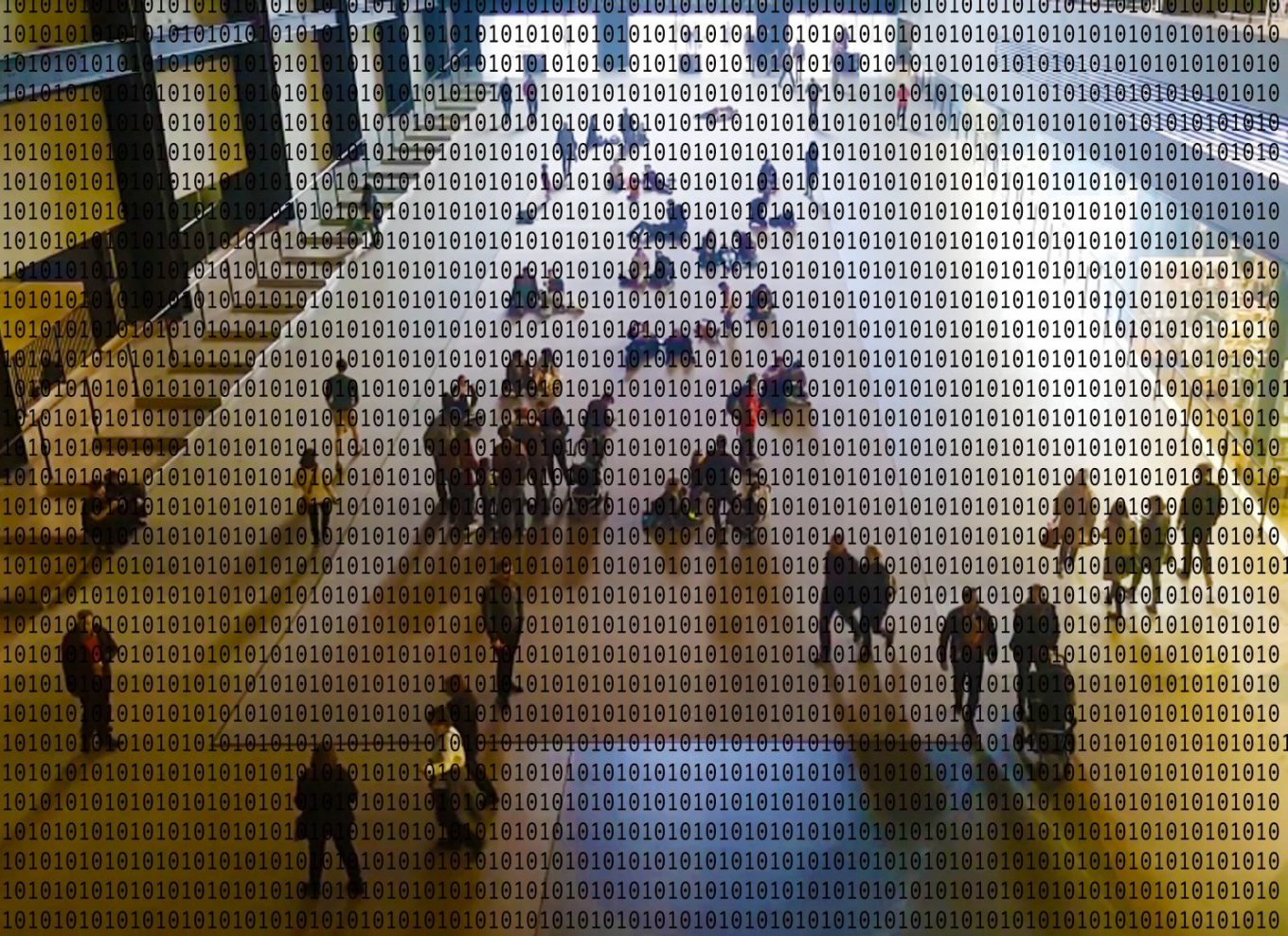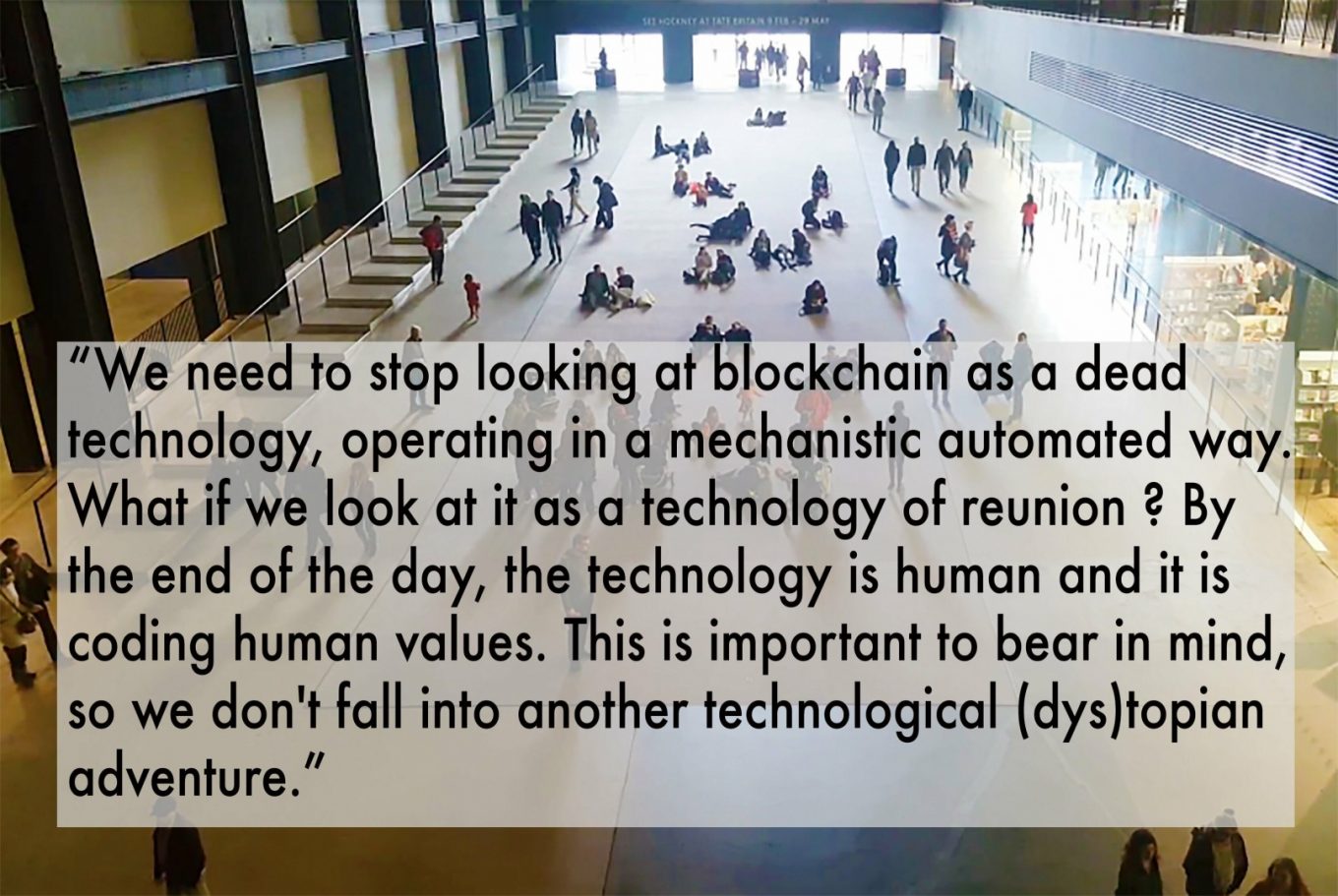
What if we would look at blockchain technology as a technology of reunion fostering more interconnection and humanity in the world? As a tool for a more empathic civilization?
The evolution of blockchain technology over the course of the past 5 years, has awakened the hope in a distributed economy. This new evolution of the economy could serve as an alternative to the current market-based capitalist economy, and its negative effects of rising inequality, profound individualism and constant climate crisis.
A distributed economy can be described as a busy network of relationships that allows small and medium sized enterprises to connect and interact through information technology. In a distributed economy, there is no need of a central system to boost activity and sustainable productivity. This system, seen as post capitalist, opens the doors (theoretically) for all entities within the network regardless of size or location, to innovation and evolution.
But something else is also needed, for a distributed economy to be real. The entities within the network are run by people. And in order for us to have a truly new distributed economy, we need a new mindset, guiding the decisions of its business leaders and entrepreneurs.
Are We Already Living in a Distributed Economy?
Gone are the days when one would work 40 years doing the same trade, for the same company.
On one hand, and particularly in the West, one can thus say that we are already living in a distributed economy. Adam Lent, who is an author who has followed the potential for transformation of blockchain, has described in his book Small is Powerful, how ownership, power and resources have become dispersed on a smaller scale since the 1970’s, with the help of technology, in a way that he considers better for everyone.
“Millions are setting up their own small businesses; political and social change is increasingly delivered by grassroots initiatives; and more people are making their own decisions about how to live their lives. “
Lent has also followed the blockchain revolution from its inception. He wrote in 2014:
“The truth is that blockchain technology, combined with the growing popular desire for autonomy, holds the promise of a rapidly decentralising world over coming decades. Many of the large hierarchical organisations that have dominated government and commerce since the early twentieth century could face a life-threatening challenge.”
But is this view of blockchain and a distributed economy, just a beautiful eye catching marketing narrative or does it correspond to reality ?
By the end of the day, blockchain is just a new type of database, a distributed one. Implementing it at a large scale, could enable it as the main architecture structuring a sustainable distributed economy.
Since 2014, blockchain technology evolved at fast pace. Unfortunately over the past few years, we have also witnessed how some of the values guiding the entrepreneurs operating in the exciting field of blockchain are not exactly the ones most in tune with a fair distributed economy. The ICO’s scandals of 2018 triggered disbelief in its potential to give answers to the problems of the market economy, particularly because of what happened in the crypto world.
What needs to be done to truly find the real transformative potential of such decentralised technologies ? How can these technologies help us generate new economic ecologies that sustain human fairer economic systems, and not just more of the same? How can we make them work to avoid simply repeating the problems of the past?
Blockchain As A Technology Of Reunion
Charles Eisenstein is an author, speaker and teacher who has participated recently in a seminar debating the potential of blockchain to help reinventing the economy. Charles is widely known as one of the most active voices working alongside the lines of the new economics paradigm. He is a long time proponent of “alternative narratives,” political and economic ideas that challenge our current system. His work combines an interest in ecology with biology, earth healing, and the psyche.
Born in 1967, the author is also known for his public speaking, and advocacy of de-growth ideals. In his work, Charles dives into a variety of fascinating topics, including gift economies, negative-interest currencies, resource based economies, the importance and return of the commons and local currencies.
Eisenstein gives an interesting insight that helps explaining some of the problems of blockchain, when he writes that in his view, the fact that people are disconnected from one another has paved the way towards “technological utopias”. This is quite pertinent as it points out to one of the paradoxes blockchain technology is juggling with, which is when the technology is looked at and therefore designed, as being a dead technology, operating in a mechanistic automated way. Just think of one of its core characteristics, the smart contract:
“Smart contract is a computer code that simplifies the execution of certain agreements and eliminates the need for a middleman.”
To some this is exactly what is attractive about blockchain. As Vili Lehdonvirta writes ” blockchain technologies can be used to create “math-based money” and “unstoppable” contracts that are enforced with the impartiality of a machine instead of the imperfect and capricious human bureaucracy of a state or a bank.”
But do we want to go this way ?
Eisenstein brings a breath of fresh air when considering that looking at new technologies (such as blockchain) with new eyes, raises the technology’s potential for a different and more positive world. What underlies his thought is that we should focus on building a new type of civilisation, focused on interconnection. Charles believes that technology should foster connection and not separation. In his opinion the current scientific-industrial system has created a mindset of quantification, engineering, and control that has deleterious results – the machine view. Eisenstein suggests that instead of pursuing the traditional “technology of separation” we must begin to pursue the “technology of reunion:” an expanded definition of technology.
How could one design blockchain apps through the point of view of a “technology of reunion” as Charles Eisenstein is advocating for technology in general ? And how to move from beautifully articulated ideas, that are theoretical, into practical ones?

Is blockchain, as it stands now, a technology of separation, or reunion? This is an important question because, at the core of blockchain technology or any other technology lies a profound re configuring of humanity, of what makes us human. What we design, design us back. Just as we as humans are being rewired back by computers and social media, we will be designed back later on, by blockchain apps. As Adam Lent states:
“In a blockchain world, conventional third party regulation is not only less necessary, it also becomes more difficult, as human activity becomes diffuse and anonymous. “
Designing blockchain as a technology of reunion, that fosters connection and a fairer economy, is thus mandatory. But what does that mean? First of all, it means that coders, legislators, software engineers and entrepreneurs involved in blockchain projects, need to be operating within a whole new set of values and ideals, that impact what they design. As Vili Lehdonvirta states in an interesting article demystifying blockchain “humans are still very much in charge of setting the rules that the network enforces.”
One possible value those humans in charge of designing the technology need to focus on is growth. Instead of growth at all costs, that value needs to have a more integrated picture of other important human values.
By the end of the day, the technology is human and it is coding human values, And this is important to bear in mind, so we don’t fall into another technological (dys)topian adventure.

Maria Fonseca is the Editor and Infographic Artist for IntelligentHQ. She is also a thought leader writing about social innovation, sharing economy, social business, and the commons. Aside her work for IntelligentHQ, Maria Fonseca is a visual artist and filmmaker that has exhibited widely in international events such as Manifesta 5, Sao Paulo Biennial, Photo Espana, Moderna Museet in Stockholm, Joshibi University and many others. She concluded her PhD on essayistic filmmaking , taken at University of Westminster in London and is preparing her post doc that will explore the links between creativity and the sharing economy.


























